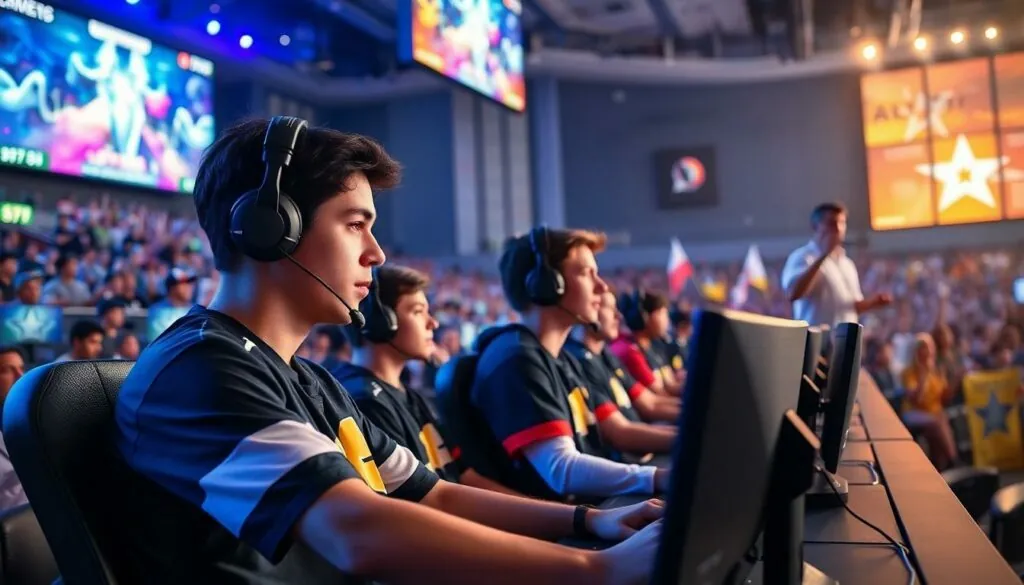Table of Contents
ToggleIn a world where competitive gaming has exploded into a global phenomenon, understanding what esports stands for is more important than ever. Picture this: gamers vying for glory, massive tournaments, and prize pools that could make a small country jealous. But what’s behind this digital spectacle?
Understanding Esports
Esports represents a dynamic realm where competitive gaming meets organized events. This sector thrives on its community of players and fans, creating a vibrant ecosystem.
Definition of Esports
Esports, short for electronic sports, consists of organized multiplayer video game competitions. Competitive formats include team-based games like League of Legends and individual games like Fortnite. Professionals and amateurs alike participate, showcasing a variety of genres, ranging from strategy to first-person shooters. Major tournaments attract large audiences, both online and in-person, contributing to the industry’s substantial growth and visibility.
History of Esports
Esports traces its roots back to the early 1970s with the first video game competitions held at Stanford University. The emergence of arcade gaming in the 1980s led to tournaments that garnered local and national attention. By the 1990s, developments in technology facilitated online play, expanding participant reach and audience engagement. The early 2000s witnessed the rise of dedicated esports tournaments and leagues, culminating in the establishment of professional organizations by the 2010s. Today, esports has matured into a billion-dollar industry with a global presence, featured in major sporting events and mainstream media.
Components of Esports
Esports combines several key elements that contribute to its dynamic nature. Understanding these components provides deeper insights into the world of competitive gaming.
Types of Esports Games
Various genres define the landscape of esports games. Multiplayer online battle arena (MOBA) titles like League of Legends and Dota 2 dominate the competitive scene. First-person shooters (FPS) such as Counter-Strike: Global Offensive and Call of Duty attract large audiences as well. Battle royale games, including Fortnite and PUBG, continue to gain popularity among players. Fighting games, like Street Fighter and Tekken, also showcase skill in one-on-one matchups. Strategy games, including StarCraft II, challenge players’ decision-making abilities. Every genre features unique mechanics and communities, adding richness to the esports ecosystem.
Esports Tournaments and Leagues
Tournaments and leagues form the backbone of esports competition. Major events, like The International for Dota 2 and the League of Legends World Championship, draw millions of viewers each year. Such tournaments often offer substantial prize pools, which can exceed millions of dollars. Professional leagues, such as the Overwatch League and Call of Duty League, provide structured competition throughout the season. Local and regional tournaments diversify opportunities for players at different skill levels. Each competition focuses on teamwork, strategy, and individual skill, contributing to the excitement of esports.
The Growth of Esports
Esports has rapidly expanded, attracting diverse audiences and shaping the gaming landscape. Competitive gaming engages millions worldwide, catering to various age groups and backgrounds.
Popularity Among Different Demographics
Younger generations dominate the esports audience, with 65% of players aged 18 to 34. However, interest spans across older demographics, as gamers aged 35 to 49 represent about 15% of participants. Significant engagement exists among females, who make up nearly 30% of esports fans. Social media platforms like Twitch have contributed to this growth by fostering communities. Additionally, mobile gaming has gained traction, appealing to players who enjoy casual yet competitive experiences. Major gaming events also attract families, bridging generational gaps and increasing overall viewership.
Impact of Technology on Esports
Technology influences every aspect of esports, enhancing gameplay and viewer experience. High-speed internet allows seamless streaming, enabling millions to watch live competitions. Advances in graphics enhance game visuals, making competition more immersive. Virtual reality and augmented reality are transforming how players and fans experience events. Streaming platforms facilitate access to diverse content, including tutorials and live matches. Mobile technology enables gamers to compete anywhere, increasing participation. Social media plays a vital role in connecting fans and players, driving community interaction.
Careers in Esports
Esports careers encompass various roles, ranging from professional players to essential support positions within teams and organizations. This growing industry offers a wide array of opportunities for those passionate about gaming.
Professional Players
Professional players excel at competing in organized gaming events. They typically focus on specific titles like League of Legends or Counter-Strike: Global Offensive to enhance their skills. Training regimens often include several hours of practice daily, fostering teamwork and strategy. Player earnings can significantly vary, with top competitors earning millions in tournament winnings and sponsorships. The dedication required to excel in this field attracts many aspiring athletes who compete for recognition and financial rewards.
Support Roles and Industry Opportunities
Support roles in esports include coaches, analysts, and marketing professionals. Coaches guide teams in strategic development, while analysts provide data-driven insights to improve performance. Marketing experts create campaigns to enhance brand visibility, engaging diverse audiences. Event organizers play a critical role in planning tournaments, ensuring successful experiences for players and fans. As esports continues to expand, opportunities in content creation, streaming, and community management arise, making it an inclusive industry.
Conclusion
Esports represents a dynamic intersection of technology and competition that’s reshaping the gaming landscape. With its diverse genres and dedicated communities, it offers something for everyone, from casual players to die-hard fans. The industry’s growth has paved the way for numerous career opportunities, making it an exciting field for those passionate about gaming. As esports continues to evolve, it’s clear that this phenomenon is here to stay, influencing not just gaming but also broader entertainment and media trends. The future holds endless possibilities for players, fans, and professionals alike.








